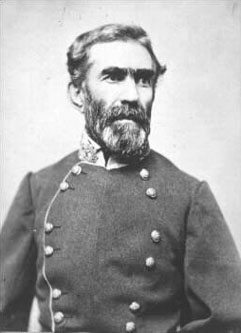| Braxton Bragg  Born: 22-Mar-1817 Born: 22-Mar-1817
Birthplace: Warrenton, NC
Died: 27-Sep-1876
Location of death: Galveston, TX
Cause of death: unspecified
Remains: Buried, Magnolia Cemetery, Mobile, AL
Gender: Male
Race or Ethnicity: White
Occupation: Military Nationality: United States
Executive summary: Confederate Army General Military service: US Army (1837-56); Confederate Army (1861-65) American soldier, born in Warren county, North Carolina, on the 22nd of March 1817. He graduated at the United States Military Academy in 1837, and as an artillery officer served in the Seminole wars of 1837 and 1841, and under General Zachary Taylor in Mexico. For gallant conduct at Fort Brown, Monterey and Buena Vista, he received the brevets of captain, major and lieutenant-colonel. He resigned from the regular army on the 3rd of January 1856, and retired to his plantation in Louisiana. From 1859 to 1861 he was commissioner of the board of public works of the state. When in 1861 the Civil War began, Bragg was made a brigadier-general in the Confederate service, and assigned to command at Pensacola. In February 1862, having meanwhile become major-general, he took up a command in the Army of the Mississippi, and he was present at the battle of Shiloh (April). The vacancy created by the death of Albert Sidney Johnston at that battle was filled by the promotion of Bragg to full general's rank, and he succeeded General Beauregard when that officer retired from the Western command. In the autumn of 1862 he led a bold advance from Eastern Tennessee across Kentucky to Louisville, but after temporary successes he was forced to retire before Don Carlos Buell, and after the battle of Perryville (8th October) retired into Tennessee. Though the material results of his campaign were considerable, he was bitterly censured, and his removal from his command was urged. But the personal favor of Jefferson Davis kept him, as it had placed him, at the head of the central army, and on the 31st of December 1862 and 2nd of January 1863 he fought the indecisive battle of Murfreesboro (or Stone river) against William S. Rosecrans, Buell's successor. In the campaign of 1863 Rosecrans constantly outmanoeuvred the Confederates, and forced them back to the border of Georgia. Bragg, however, inflicted a crushing defeat on his opponent at Chickamauga (September 19-20) and for a time besieged the Union forces in Chattanooga. But enormous forces under Ulysses S. Grant were concentrated upon the threatened spot, and the great battle of Chattanooga (November 23-25) ended in the rout of the Confederates. Bragg was now deprived of his command, but President Davis made him his military adviser, and in that capacity he served during 1864. In the autumn of that year he led an inferior force from North Carolina to Georgia to oppose William T. Sherman's march. In February 1865 he joined Joseph Eggleston Johnston, and he was thus included in the surrender of that officer to Sherman. After the war he became chief engineer to the state of Alabama, and supervised improvements in Mobile harbor. He died suddenly at Galveston, Texas, on the 27th of September 1876. General Bragg, in spite of his want of success, was unquestionably a brave and skilful officer. But he was a severe martinet, and rarely in full accord with the senior officers under his orders, the consequent friction often acting unfavorably on the conduct of the operations.
Brother: Thomas Bragg (Governor of North Carolina, b. 1810, d. 1872)
University: US Military Academy, West Point (1837)
Relieved of Command Sep-1863
Do you know something we don't?
Submit a correction or make a comment about this profile
Copyright ©2019 Soylent Communications
|